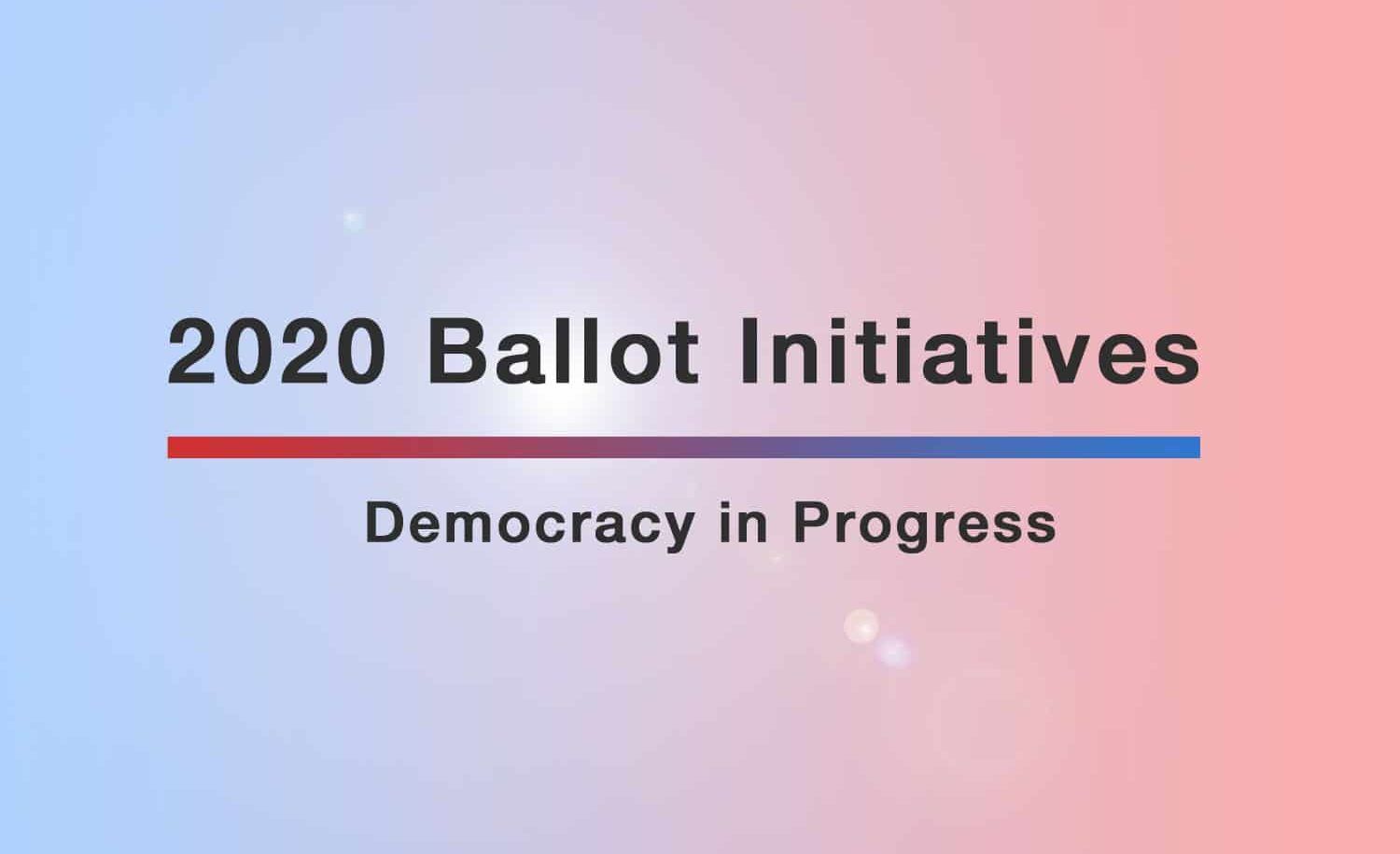
Americans demonstrated their democratic resolve in this year’s elections, supporting electoral changes that promise more choice, more competitive races, more inclusion, and more direct say in who represents them.
Despite an unprecedented barrage of attacks on the electoral system by the President of the United States and other members of his political party, the electoral system – and more importantly, those who run it – proved it could withstand the assault. Just as David Becker believed it would.
With the greatest percentage of eligible voters in the last century casting ballots – and all of their votes being fairly counted, 13 states and cities passed ballot initiatives that aim to strengthen the political system rather than a specific political party. Several initiatives, however, resulted in changes that could be considered regressive or in the case of one particular initiative on the ballot in three states, puzzlingly unnecessary.
Ranked Choice Voting Results
Ranked choice voting (RCV) is a method of voting that offers more opportunities for third-party candidates to compete within the two-party political system. In 2020, Massachusetts and Alaska asked voters if they wanted to institute RCV in their state; five cities also had RCV initiatives on the ballot.
In Alaska, the RCV initiative barely passed, with 50.55% of the vote on Measure 2, which also contained other initiatives noted below. The state plans to implement RCV in Alaska presidential elections after 2020 for all candidates who qualify for the ballot, as well as write-in candidates, and “top four” candidates in open primaries for congressional races.
In Massachusetts, voters chose to stick with the existing system, voting down the RCV measure by 54.8% to 45.2%. Known on the ballot as Question 2, it would have implemented RCV for general and primary elections for US House and Senate seats, state primary and general elections, and county offices.
Analyzing the vote for Boston.com, which is owned by the Boston Globe, Nik DeCosta-Klipa attributed the defeat to a reduced ability to campaign against public skepticism during the coronavirus pandemic. His report suggests that the nuances of RCV may have proved too overwhelming to voters already struggling to adjust to the expansion of early and mail-in voting.
WGBH reported that holding community forums and adequately informing the public during a pandemic was difficult and that perhaps voters opted for the status quo as a safer choice during these turbulent times.
All five cities with RCV on the ballot passed the measure. The city councils in Albany, CA, Eureka, CA, and Minnetonka, MN all voted unanimously to approve RCV for local elections. In Bloomington, MN, the city council voted 6-1 to allow RCV in mayoral and council elections, but not in school board elections. In Boulder, CO, voters decided they wanted to elect their mayor directly, rather than having him or her chosen by the city council. With the same vote, they also chose to make the election of mayor by RCV.
Fairer Redistricting: One Yea, One Nay
Initiatives to fight gerrymandering and form nonpartisan redistricting commissions won in Virginia, but lost in Missouri.

In Virginia, despite concerns among some Democrats and former supporters that a constitutional amendment did not go far enough to assure the independence of the redistricting process, voters said “Yes” to Question 1, with 66% agreeing that the amendment was an improvement over the existing redistricting system.

In Missouri, voters elected to undo an anti-gerrymandering reform that they had supported with 62% of the vote in 2018. This time, just 51% of voters supported the reversal of that fairer redistricting initiative. The new amendment eliminates the position of nonpartisan demographer who, under the 2018 reform, would have drawn the district lines after the results of the 2020 census were finalized.
More importantly, the amendment diminishes the fairness and competitiveness criteria that were to be part of the calculation for drawing those boundaries. The original criteria approved in 2018 had called for districts with equal populations; that didn’t marginalize minority communities; and that were fair and competitive in terms of political party divisions as well.
Former Felon Voting
California voters passed Proposition 17 with 59% approval. Prop 17 will restore voting rights to 50,000 former felons who are now parolees, allowing them to register to vote. Former felons on probation already have the right to vote in California.
Proponents of the new law, including Vice President-elect Kamala Harris (D), say it is good for democracy and public safety. In a statement reported in the Los Angeles Times, California Secretary of State Alex Padilla (D) said, “Research shows that in jurisdictions where voting rights are more easily restored, formerly incarcerated individuals re-offend at lower rates.”
Open Primaries
Alaska and Florida had ballot measures on whether to allow some form of open primary. An open primary is one in which voters can vote for candidates of any party affiliation. Some states require registered Democrats or Republicans to vote on separate ballots, which only list candidates of their party.
Only Alaskans approved this change to primary voting. In Florida, the proposal had to attain a supermajority of voters, or 60%, to pass, but came up short with 57%. The Fulcrum reports that Republican and Democratic leaders both generally oppose open primaries, because such a system would remove the guarantee that one candidate from each party would be placed on a ballot.
Open Primaries, an organization advocating for electoral reform, said it will continue to push for change in 2021 and beyond. They argue that open primaries make the political system work better by rewarding candidates who appeal to the center instead of to the red or blue bases.
Other Ballot Measures
Other 2020 ballot measures included citizenship requirement for voting, opportunities to change the way the president is selected, and an effort to combat monetary influence in elections:
- Alabama, Colorado, and Florida all passed measures specifying that voters must be US citizens. Similar measures had previously passed in North Dakota and Arizona. As reported by the Colorado Sun, opponents noted that such measures may confuse people into thinking “there’s not already a citizenship requirement to vote in almost all elections nationwide”, said Julian Camera, a field organizer for the American Civil Liberties Union of Colorado. In an election year when the Republican Party repeatedly and falsely claimed massive voter fraud, this kind of ballot measure likely contributed to baseless concerns regarding the integrity of the final election results.
- Colorado also voted to eliminate the right of 17-year-old citizens to vote in primary elections, even if they will reach the age of 18 by Election Day. California rejected a similar proposal (Prop 18) that would have granted 17-year-olds the right to vote in primary and special elections.
- A majority of Coloradans voted “yes” to have Colorado join the National Popular Vote Interstate Compact, which would give the state’s nine electoral votes to the presidential candidate who wins the national popular vote if states representing at least 270 Electoral College votes had adopted the compact. Colorado joins 14 states and the District of Columbia in supporting the popular vote as a means to election.,
- Alaska passed its Better Elections measure to fight the presence of “dark money” in Alaska elections, and Oregon voters passed a measure that supports campaign finance reform.
A Cautious Celebration
2020 was a good year in many respects for extending voting rights and making elections more competitive. Nonetheless, in our democracy, issues are not always settled by one election. Rather than accept and support the people’s decisions on particular ballot initiatives, some state legislatures have used new ballot initiatives, as we saw in Missouri, as well as new legislation and court battles to defy the intentions of those measures and the will of the majority.
In Florida, for example, a 2018 initiative won with 65% of the vote to reinstate voting rights to former felons who had served their time in prison. Those opposed to that decision passed legislation to undermine it, then fought a court battles that culminated in 2020 with a final series of court cases that ultimately denied most eligible former felons voting rights if they couldn’t pay off court debts and restitution before registering to vote. However, in Michigan, after a long and costly court battle, the people were able to retain the new, nonpartisan redistricting commission that they had campaigned and voted for in 2018.
As these examples demonstrate, and the baseless accusations of voter fraud demand, voters need to remain vigilant and engaged once their ballots are cast. No decision can be considered permanent when one side refuses to respect the vote, and particularly in our current political climate, no battle can ever be considered over.
Sources
Yes on 2 Campaign, “Yes on 2 Campaign Concedes in Ranked Choice Voting Ballot Initiative Vote”, Nov 4, 2020, https://www.yeson2rcv.com/yes-on-2-campaign-concedes/, accessed Nov 8, 2020
Nik DeCosta-Klipa, “What went wrong for ranked choice voting in Massachusetts?”, Boston.com, Nov 5, 2020 https://www.boston.com/news/politics/2020/11/05/massachusetts-question-2-ranked-choice-voting-what-went-wrong, accessed Nov 8, 2020
Ballotpedia, Ranked Choice Voting, 2020, https://ballotpedia.org/Ranked-choice_voting_(RCV)#Ballot_measures, accessed Nov 10, 2020
Craig LeMoult, “Why Did Massachusetts Reject Ranked-Choice Voting?”, WGBH, Nov 4, 2020, https://www.wgbh.org/news/politics/2020/11/04/why-did-massachusetts-reject-ranked-choice-voting, accessed Nov 8, 2020
Ballotpedia, “Virginia Question 1, Redistricting Commission Amendment (2020)“, https://ballotpedia.org/Virginia_Question_1,_Redistricting_Commission_Amendment_(2020), accessed Dec 21, 2020
Fair Vote, “Ranked Choice Voting 2020 Ballot Measures”, Nov 2020, https://www.fairvote.org/rcv_2020_ballot_measures, accessed Nov 8, 2020
Graham Moomaw, “In historic change, Virginia voters approve bipartisan commission to handle political redistricting”, Virginia Mercury, Nov 4, 2020, https://www.virginiamercury.com/2020/06/24/virginia-democratic-party-urges-voters-to-defeat-redistricting-reform-amendment/, accessed Nov 9, 2020
Jason Rosenbaum, “Missourians Scrap Clean Missouri Redistricting Plan, Pass Amendment 3”, St. Louis Public Radio, Nov 4, 2020, https://news.stlpublicradio.org/government-politics-issues/2020-11-04/missourians-scrap-clean-missouri-redistricting-plan-pass-amendment-3, accessed Nov 9, 2020
Zack Budryk, “California votes to return voting rights to felons on parole”, The Hill, Nov 4, 2020, https://thehill.com/homenews/state-watch/524452-california-votes-to-return-voting-rights-to-felons-on-parole, accessed Nov 9, 2020
Patrick McGreevy, “Prop. 17, which will let parolees vote in California, is approved by voters”, Los Angeles Times, Nov 4, 2020, https://www.latimes.com/california/story/2020-11-03/2020-california-election-prop-17-results, accessed Nov 10, 2020
Gary Fineout, “Final tally: Group says 67,000 felons registered in Florida after Amendment 4”, Politico, Oct 19, 2020, https://www.politico.com/states/florida/story/2020/10/19/final-tally-group-says-67-000-felons-registered-in-florida-after-amendment-4-1327176, accessed Nov 10, 2020
Sara Swann, “Bids for open primaries falling short in both Florida and Alaska”, The Fulcrum, Nov 4, 2020, https://thefulcrum.us/florida-open-primary-2648622934, Nov 9, 2020
Patty Nieberg, “Colorado, two other states pass amendments clarifying that “only citizens” can vote”, The Associated Press/Report for America, Nov 8, 2020, https://coloradosun.com/2020/11/08/amendment-76-colorado-passes/, accessed Nov 10, 2020
The Colorado Sun, “How the 11 statewide ballot measures fared in Colorado: In short, it’s a split verdict”, Nov 4, 2020, https://coloradosun.com/2020/11/04/colorado-2020-ballot-measures/, accessed Nov 10, 2020
National Popular Vote, “Agreement Among the States to Elect the President by National Popular Vote”, https://www.nationalpopularvote.com/written-explanation, accessed Nov 23, 2020
Ballotpedia, Alaska Ballot Measure 2, Top-Four Ranked-Choice Voting and Campaign Finance Laws Initiative (2020), 2020, https://ballotpedia.org/Alaska_Ballot_Measure_2,_Top-Four_Ranked-Choice_Voting_and_Campaign_Finance_Laws_Initiative_(2020), accessed Dec 17, 2020
RepresentUs, Measure 107: Fair and Honest Elections, Nov 2020, https://represent.us/election2020/2020-oregon-107/, accessed Nov 10, 2020
Have a Suggestion?
Know a leader? Progress story? Cool tool? Want us to cover a new problem?

